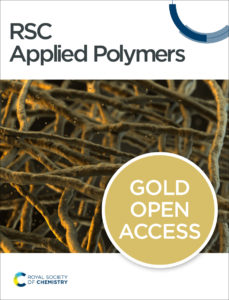To celebrate the growth and development of the RSC Applied Polymers community and to highlight the remarkable authors who continue to contribute their high quality work to the journal we would like to share the opinions and insights of these authors through this introductory blog post. Once dubbed #RSCAppliedfirst50, our blog posts aim to give a voice to the authors behind the research and hope that their insights might shed light upon growing challenges and progress in polymer science and its applications.
In this edition, we hear from Dr Jayeeta Bhaumik about their study entitled ‘Development of casein-based nanonutraceuticals by entrapping anthocyanin derived from secondary-agricultural residues: A step towards functional food additives‘
An introduction to ‘Development of casein-based nanonutraceuticals by entrapping anthocyanin derived from secondary-agricultural residues: A step towards functional food additives’ by Dr Jayeeta Bhaumik.
The article describes preparation of nanonutraceuticals using anthocyanin (a natural antioxidant) entrapped in casein. The extraction of anthocyanins was achieved using various agro-waste (blue berry, black wheat bran and black plum) followed by their subsequent nanoencapsulation using casein as a trapping material. Interestingly, the nanoencapsulation process protects anthocyanins from environmental influencers namely, temperature, pH, and light, by improving its stability. Moreover, the encapsulation enhanced bioavailability of anthocyanins as evidenced by the in vitro gastrointestinal digestion experiment. The high encapsulation efficiency, and improved physicochemical stability of anthocyanin-casein-based nanoparticles (A-CNPs), particularly in the case where anthocyanin was extracted from blue berry (BB@A-CNPs). This is a new addition to nanonutraceutical based food additives for multipupose use.
Anthocyanins are water-soluble plant pigments that belong to the flavonoid class within the polyphenolic group. ACNs are widely present in nature and responsible for the different colors of various plant parts. Despite being highly antioxidant rich, the major drawback of using anthocyanin in food additives comes from its sensitivity to heat, pH and light. To our delight, entrapment of this rich nutraceutical into a natural polymer, casein alleviated all such sensitivities. Further, the formation of nanonutraceutical via the entrapment of anthocyanin into casein significantly improved the stability and bioavailability of anthocyanin. Casein originally being milk protein is a safe platform to use along with anthocyanin as food additive.
The anthicyanins extracted from agro-waste were utilized to prepare nanonutraceuticals via the entrapment in casein. Nanonutraceutical formation using the combination of anthicyanin and casein improved bioavailability under in vitro gastrointestinal digestion. Thus, these A-CNPs particularly BB@A-CNPs, could potentially be integrated into dairy products or other food systems to boost their nutritional value and health benefits. Future research should be focused on scaling up the production process and conducting in vivo studies to further validate the health claims associated with consuming these anthocyanin-based nanonutraceuticals. The findings of present study contribute to the circular economy by repurposing food waste and highlighting the potential of nanoencapsulation in improving the utility and applicability of bioactive compounds in the food industry.
The interesting combination of anthocyanin and casein both being derived from natural sources is a cost-effective formula to derive food additives and colorants. Upscaling of this product and giving trial to use this interesting nanonutraceutical as food additive as well as colorants would replace existing chemical-based colorants. Future research will therefore be to focus on scale up the production process and conducting in vivo studies to further validate the health claims associated with consuming these anthocyanin-based nanonutraceuticals.
The findings of present study contribute to the circular economy by repurposing food waste and highlighting the potential of nanoencapsulation in improving the utility and applicability of bioactive compounds in the food industry.

Maninder Meenu
Dr. Maninder Meenu is a distinguished researcher with an impressive academic and scientific track record, particularly noted for her contributions to food science and technology. Holding a Ph.D. in Science from CSIR-Central Scientific Instruments Organisation and the Academy of Scientific and Innovative Research, India, her work has significantly impacted areas such as food processing, microbiology, chemistry related to safety, quality, and stability, natural product chemistry, post-harvest quality, and agri-food waste valorization. Her professional experience spans various institutions in India and China, such as the National Agri-Food Biotechnology Institute, Mohali, India; Guru Nanak Dev University, Amritsar, India; Zhejiang University, Hangzhou, China; and Beijing Normal-Hong Kong Baptist University, Zhuhai, China. Her publication portfolio boasts a total impact factor of ≈300 across 60 publications in top journals of food science, such as Trends in Food Science & Technology, Critical Reviews in Food Science and Nutrition, Food Hydrocolloids, and Food Chemistry. In addition to her research articles, she has co-authored several book chapters.

Mansi
Mansi is a postgraduate researcher specializing in Microbial and Food Technology. She has a strong focus on the development of sustainable bioactive delivery systems and smart food packaging. Mansi has completed my Master of Science (Hons) from Department of Biotechnology and Food Technology, Punjabi University Patiala. Her research interests lie at the intersection of food science, nanotechnology, and natural product chemistry. She has contributed to the advancement of functional food systems and active packaging technologies through nanoencapsulation strategies utilizing naturally derived materials such as lignin and casein. She is committed to promoting eco-friendly innovations in food and health related industries. Looking ahead, Mansi is eager to further explore the molecular mechanisms underlying bioactive functionality and to engineer next-generation delivery systems that can revolutionize nutrition and therapeutic interventions. Through interdisciplinary research, she aim to contribute to the development of intelligent food systems and biocompatible materials that support both human and planetary health.

Anil Kumar Pujari
Anil Kumar Pujari is currently doing his Ph.D. in Chemical and Material Science under the guidance of Dr. Jayeeta Bhaumik, Scientist-E at BRIC-National Agri-Food Biomanufacturing Institute (BRIC-NABI). He completed his Bachelor’s degree in Pharmacy from the University Institute of Pharmacy, Pt. Ravi Shankar Shukla University in Raipur, Chhattisgarh. He received a Master’s degree in MS Pharm. (Medicinal & Pharmaceutical Chemistry) from the National Institute of Pharmaceutical Education and Research (NIPER), Mohali, Punjab. His research currently focuses on the development of small and porphyrin molecules for Photodynamic therapy and the synthesis of porous materials for CO2 fixation to convert value-added chemical products. His research outcome generated multiple patents and high impact research articles in the areas of agri-biomass valorization.

Monika Garg
Dr. Monika Garg is Scientist-F (faculty) at BRIC National Agri-Food and Biomanufacturing Institute (Formerly National Agri-Food and Biotechnology Institute, NABI). She holds M.Sc. in Biochemistry from Punjab Agricultural University (PAU), Ludhiana and Ph.D. in Genetics and Plant Breeding from Tottori University, Japan. Her postdoctoral research involved Grain Processing Quality at Tottori University, Japan. She served as Associate Scientist at the International Center for Agricultural Research in the Dry Areas (ICARDA), Syria before joining NABI, Mohali. Dr Garg’s resea research specializations are development of designer crops with improved nutritional and processing quality, Utilization of plant breeding and wide introgression approaches for public benefit. Her research group has developed biofortified Black wheat with anthocyanins as antioxidants, conducted functional and health studies on black wheat. From her research outcome, NABI has signed MOUs/NDA with 28 companies for black wheat commercialization. She is heading multiple international/national projects. Her research group has filed 4 patents, published 70+ international publications and 11 book chapters. Dr. Garg is actively collaborating with farmers and industry stakeholders to drive implementation and adoption of innovative agricultural solutions.

Jayeeta Bhaumik
Dr. Jayeeta Bhaumik is Scientist-E (faculty) at BRIC National Agri-Food and Biomanufacturing Institute (Formerly Center of Innovative and Applied Bioprocessing, CIAB). She obtained Ph.D. in Chemistry from North Carolina State University, USA. She carried out postdoctoral research at Harvard Medical School/Massachusetts General Hospital for four years while working in the interface of nanotherapeutics and in vivo imaging. She came back to India and joined NIPER Mohali as DST Women Scientist. Next, she worked as an assistant professor of Medicinal Chemistry at NIPER Kolkata. She joined DBT-CIAB as a Scientist in 2016. Dr Bhaumik works on the valorization of agri-waste-based lignin via developing functional materials and platform chemicals. She has ~60 publications, 12 patents, and multiple book chapters to her credit. Agri-waste based technologies developed in by her research group were transferred to agro-industries for commercialization. With over 20 years of research experience in chemical and material science, both in India and abroad, Dr. Bhaumik has proven herself to be a transformative figure in the field. Her work in developing lignin-based, low-cost, sustainable materials holds the potential to be a game-changer, not only for the Indian market but on a global scale.
Development of casein-based nanonutraceuticals by entrapping anthocyanin derived from secondary-agricultural residues: a step towards functional food additives
Maninder Meenu, Mansi, Anil Kumar Pujari, Monika Garg and Jayeeta Bhaumik
RSC Appl. Polym., 2025, Advance Article. DOI: 10.1039/D4LP00363B
 |
RSC Applied Polymers is a leading international journal for the application of polymers, including experimental and computational studies on both natural and synthetic systems. In this journal, you can discover cross-disciplinary scientific research that leverages polymeric materials in a range of applications. This includes high impact advances made possible with polymers across materials, biology, energy applications and beyond.
|



